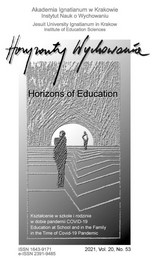Lokowanie idei rodziny w komunikacji perswazyjnej w Sieci na przykładzie kampanii crossmedialnych koncernów międzynarodowych
Positioning the Concept of Family in Persuasive Communication on the Internet, as Exemplified by Cross-media Campaigns of International Corporations
Author(s): Klaudia Cymanow-SosinSubject(s): Media studies, Family and social welfare, Marketing / Advertising, ICT Information and Communications Technologies
Published by: Uniwersytet Ignatianum w Krakowie
Keywords: content; narration; persuasion; advertising; values;
Summary/Abstract: RESEARCH OBJECTIVE: The article is an attempt at evaluating the way and motivation behind the positioning of concepts related to family and its models, as used in persuasive communication employed by international corporations and pertaining to creations featured on YouTube advertising channels. THE RESEARCH PROBLEM AND METHODS: In the part preceding the conclusions, certain advertising communications were analysed in order to pick out, describe, classify and evaluate basic purposes for which the concept of family. The study used the method of content analysis (Krippendorff, 2004, pp. 87-89). THE PROCESS OF ARGUMENTATION: Reference to the category of family in the post-consumer era is a phenomenon or particular importance, because together with cultural and social transformations – based primarily on the shaping ideologies – it is necessary to redefine the models of family presented in contemporary advertisements. RESEARCH RESULTS: It follows from the analyses that the creators of advertisements use family motifs not only to reflect the condition of a specific society in their own creative ideas, but also to play with conventions or even attempt to contest the values nourished in the society they are addressing. CONCLUSIONS, INNOVATIONS, AND RECOMENDATIONS: The ways of portraying family in advertisements, as described in this article, in the first phase of reception affect the “elevation of the communication” and transfer it from the representational sphere to the area of psychological and then axiological deliberations, and ultimately they may have a real ideological purpose also to certain changes in the hierarchy of values and beliefs.
Journal: Horyzonty Wychowania
- Issue Year: 19/2020
- Issue No: 49
- Page Range: 89-100
- Page Count: 12
- Language: Polish

